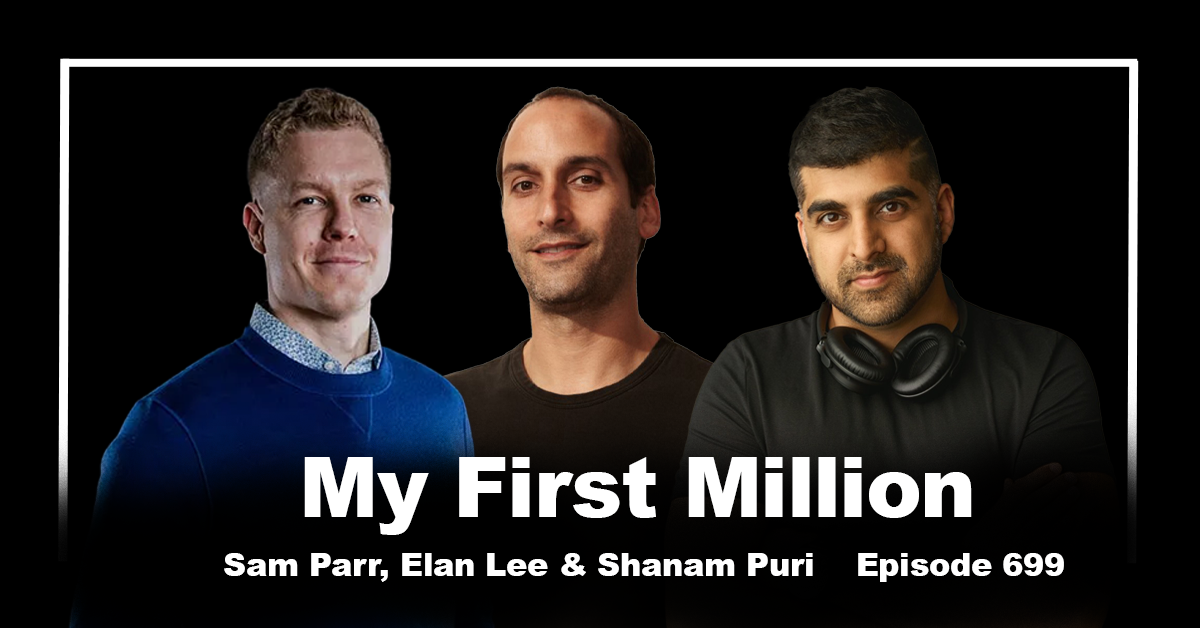Hey everyone,
This episode features Sam Parr and Shaan Puri interviewing Elan Lee, the co-creator of the phenomenally successful card game Exploding Kittens. They delve into the fascinating journey of growing the company from a modest $10,000 Kickstarter goal into a global powerhouse, reportedly valued in the hundreds of millions, if not billions. Elan shares the origin story, the unconventional strategies, and the core philosophies that propelled Exploding Kittens beyond a one-hit wonder into a major player in the game industry.
The conversation covers the initial Kickstarter campaign that shattered records (raising nearly $9M instead of $10K), the critical decision to focus on community (“the crowd”) over traditional funding metrics, and Elan’s unique approach to game design and marketing. He reveals clever, low-budget marketing hacks used at conventions, emphasizes the power of constraints in fostering creativity, and explains his core principle: games shouldn’t be entertaining, they should make the players entertaining. They also discuss innovation born from irritation and Elan’s collaboration with Tim Ferriss.
Here are the detailed key insights and takeaways:
Kickstarter Success & Origin Story:
- The Spark: Elan, formerly Chief Design Officer at Xbox, felt games were becoming isolating. He wanted to recapture the social, face-to-face fun of tabletop gaming from his childhood after seeing his niece/nephew ignore him while playing an Xbox game he designed.
- Humble Goal, Massive Result: Aimed to raise $10K (minimum print run cost) on Kickstarter. Hit the goal in 7 minutes, reached $2M in 48 hours, and ultimately raised nearly $9M with 219,000 backers (a Kickstarter record).
- The Oatmeal Boost: Partnering with Matthew Inman (The Oatmeal) was critical. His initial post drove the first million in ~12-24 hours.
- Focus on the Crowd: After hitting $2M early, they pivoted strategy. Instead of focusing on funding stretch goals, they focused entirely on crowd stretch goals (e.g., “Show us 10 Batmans in a bathtub,” “Show us 100 people dressed as cats”) to build community and virality, ignoring further monetary incentives. The funding became a side effect.

Game Design Philosophy:
- “Games should not be entertaining; they should make the people you’re playing with entertaining.” This is the core principle. The goal is to create a toolset for players to entertain each other, leading to replayability and viral sharing.
- The Litmus Test: The single most important question in playtesting: “Do you want to play again?” Only games scoring 100% “yes” get shipped.
- Designing for Shared Experience: Focus on mechanics that create interaction, surprise, alliances, betrayals, and shared moments between players.
- Simplicity & Accessibility: Games should be easy to learn (e.g., learn in a minute, play in 10).

Marketing & Unconventional Tactics:
- Zero-Budget Hacks: Lacking funds post-Kickstarter, they relied on creativity.
- Urinal Marketing: Placed laminated kitten cutouts holding bombs in urinals at the PAX convention (“pee to extinguish”). Mobbed their booth, got pushback, but generated huge buzz.
- The World’s Coolest Vending Machine: Built an 8-ft tall, fur-covered “cat” vending machine costume. Dispensed games and random $1 items (burritos, pineapples) – hand-delivered by staff hidden behind a curtain. Created massive lines and spectacle.
- Push Past the ‘No’: When told they couldn’t ship produce to a convention without being a registered grocer, Elan registered Exploding Kittens as a grocer in Indiana (and 14 other states) rather than accepting the limitation.
- Building Community: Focus on creating experiences and interactions that connect players beyond the game itself (e.g., the shoe message idea).

Creativity, Innovation & Business:
- Creativity Loves Constraints: Instead of blue-sky brainstorming, start with clear parameters and constraints (e.g., “build the coolest vending machine,” “design an NFL game around the feeling of a miracle catch”). This focuses creativity.
- Irritation as Innovation Source: (Referencing Seinfeld) Problems, annoyances, and things that “feel wrong” are often the best starting points for innovation (e.g., Elan’s frustration with isolating video games, boring kids’ games).
- Business as a Game: Elan initially disliked the business side but learned to see strategy, partnerships, and problem-solving as a fascinating game with no answers in the back of the book, similar to computer science.
- Perfectionism: Elan maintains incredibly high standards for production quality (e.g., rejecting shipments for minor color variations), believing the details matter for creating “boxes of joy.”

Final Thought:
Elan Lee’s story is a powerful testament to how creativity, community focus, and a willingness to challenge norms can build an empire, even in a space often driven by luck. His philosophy of making the players the source of entertainment, combined with ingenious, constraint-driven marketing and a refusal to accept “no,” offers valuable lessons for entrepreneurs and creators in any field. It’s a reminder that passion, playfulness, and genuine connection can be incredibly potent business strategies.
Find the Guests:
- Elan Lee: https://x.com/elanlee
Until next time,
The Podcast Notes Team





